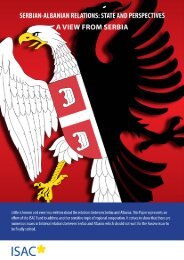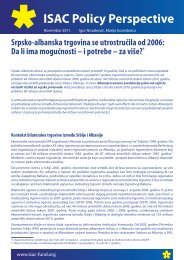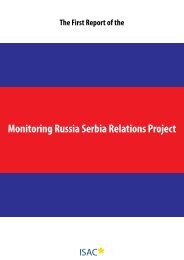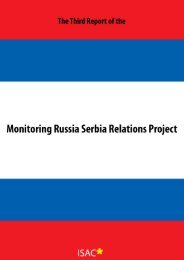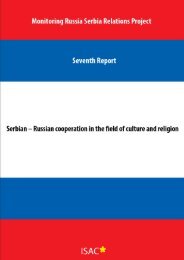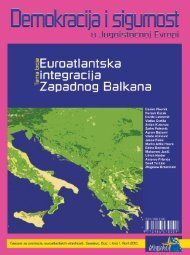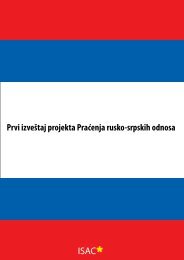the process of security sector reform - ISAC Fund
the process of security sector reform - ISAC Fund
the process of security sector reform - ISAC Fund
You also want an ePaper? Increase the reach of your titles
YUMPU automatically turns print PDFs into web optimized ePapers that Google loves.
Robert S. Tomasovic PEACE KEEPING MISSIONS<br />
Robert S. Tomasovic PEACE KEEPING MISSIONS<br />
etc. These are civilians who make decisions about what is to be done and by<br />
whom − civilian and military − such as UNSCR 1244 in Kosovo or how many<br />
Nigerian troops are going to Monrovia and with what ROE, and authorizing<br />
military actions in o<strong>the</strong>r countries such as Afghanistan and Iraq. However part<br />
<strong>of</strong> <strong>the</strong> authorization for interventions should include plans for <strong>the</strong> aftermath <strong>of</strong><br />
war − <strong>security</strong> and stability, disarming combatants, humanitarian assistance to<br />
civilian victims, repair <strong>of</strong> infrastructure, transition <strong>of</strong> civilian rule, rule <strong>of</strong> law,<br />
etc. These are areas in which civilians must be assisted to assume major roles and<br />
military a supportive role - especially in <strong>security</strong> until civilian <strong>security</strong> forces can<br />
take over or, if that is delayed, until peacekeeping forces can be introduced.<br />
Host nationals must, at <strong>the</strong> end <strong>of</strong> <strong>the</strong> day, become <strong>the</strong> government <strong>of</strong> <strong>the</strong> country<br />
and <strong>of</strong> its civil institutions. However <strong>the</strong>se host nationals evolve into <strong>the</strong>ir<br />
leadership roles; it is <strong>the</strong>ir country and <strong>the</strong>y need to be supported, pushed, exhorted,<br />
or whatever it takes to motivate and assist <strong>the</strong>m to assume <strong>the</strong>ir responsibilities.<br />
The role <strong>of</strong> <strong>the</strong> international humanitarian civilian community - IGOs and NGOs<br />
is to <strong>of</strong>fer assistance, <strong>of</strong>ten first in <strong>the</strong> form <strong>of</strong> relief to help meet initial basic<br />
humanitarian needs: water, food, shelter, medical care, etc. These relief agencies<br />
cannot function effectively as we have seen in Iraq and Afghanistan without basic<br />
<strong>security</strong>, which at <strong>the</strong> beginning only military peacekeeping forces can provide,<br />
until civilian <strong>security</strong> services are able to address <strong>security</strong> issues. IGO civilian<br />
organizations may be called upon to administer <strong>the</strong> country at least initially<br />
such as in Kosovo and East Timor. When <strong>the</strong> acute humanitarian effects <strong>of</strong> <strong>the</strong><br />
conflict have been mitigated, IGO and NGO civilian organizations transition to<br />
development assistance to help host national civilians to establish sustainable<br />
institutions: education, rule <strong>of</strong> law, civil administration, etc. – for sustainable<br />
nation building.<br />
especially child soldiers, have no experience as civilians and have no skills that<br />
are needed in civilian society. Civilian authorities in neighboring countries may<br />
see opportunities to enhance <strong>the</strong>ir own individual or national economic and<br />
strategic positions as a result <strong>of</strong> <strong>the</strong> compromised status <strong>of</strong> <strong>the</strong> neighbor who has<br />
just come through a conflict situation. International organizations such as <strong>the</strong><br />
UN, AU, etc., must address this neighborly opportunism, through political and if<br />
necessary military intervention to maintain international borders.<br />
This paper was originally published in <strong>the</strong> Compendium <strong>of</strong> lectures from<br />
The Third School <strong>of</strong> Security Sector Reform, in 2004.<br />
International and national civilian agencies help host national military personnel<br />
transition to civilian status. The literature talks about this <strong>process</strong> as disarmament,<br />
demobilization, reintegration, and reconciliation (DDRR). Real challenges lie in<br />
reintegration especially in light <strong>of</strong> <strong>the</strong> usually decimated economic situation with<br />
resultant high unemployment <strong>of</strong> civilian victims even before military personnel<br />
are demobilized and swell <strong>the</strong> number <strong>of</strong> unemployed. Retraining programs<br />
for demobilized combatants are essential for <strong>the</strong>ir integration into civilian<br />
society. Reconciliation between personnel who formerly fought each o<strong>the</strong>r and<br />
victimized non-combatants is also extremely difficult. Many military personnel,<br />
198 199





